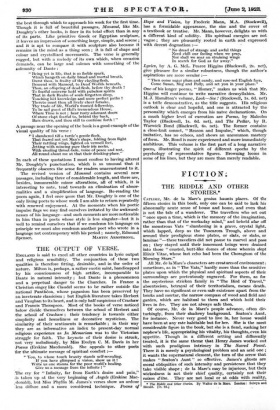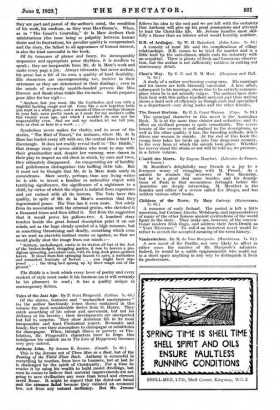FICTION
THE RIDDLE AND OTHER STORIES.*
CATLIKE, Mr.- de in Mare's genius haunts places. Of the fifteen stories in this book, only one can be said to lack his abnormally acute sense of house and home, and even that is not the tale of a wanderer. The travellers who set out " once upon a time, which is the memory of the imagination, rather than that of the workaday mind," and beheld afar off the monstrous Vats " slumbering in a grave, crystal light, which lapped, deep as the Tuscarora Trough, above and around their prodigious stone plates, or slats, or slabs, or laminae "—these travellers did not pause to marvel and pass on ; they stayed until their innermost beings were drained into those " crusted, butt-like domes of stone wherein slept Elixir Vitae, whose last echo had been the Choragium of the Morning Stars."
All Mr. de la Mare's characters are creatures of environment sometimes, as in " The Vats," hardly more than the sensitive plates upon which the physical and spiritual aspects of their surroundings are portentously engraved. For them, as for the mysterious stricken family in " The Bird of Travel," absenteeism, betrayal of their territorialism, means death. They have no significant or even safe existence apart from the bricks and mortar, the narrow compass of wood and• field and garden, which are habitual to them and which hold their lives in fee. They are not always safe then.
Of course, Mr. de In Mare's people advance, often di0- turbingly, from their shadowy background. Seaton's Aunt, for instance. Never very good to live in, her house would have been at any rate habitable but for her. She is the most considerable figure in the book, but she is a fiend, sucking her nephew's life, appropriating his vitality, his thoughts, even his appetite. Though in a different setting and differently treated, it is the same theme that Henry James worked out with such prodigious intricacy in The Sacred Fount. There it is merely a psychological problem and an arid one ; it wants the supernatural element, the turn of the screw that makes " Seaton's Aunt"" so effective. James's ghosts are moral obliquities of such intensity and persistence that they take visible shape ; de in Mare's may be injurious, but their wickedness is not their chief quality, certainly not their raison d'etre. They are not local or at odds with reality, • The Riddle and Other Stories. By Walter de la Mare. London: Selwyn and Blount. 17e. ed.]
they are part and parcel of the author's mind, the condition of his work, his medium, as they were Hawthorne's. When, as in. " The Count's Courtship," de la Mare declines their ministrations (the issue being so palpably between human desire and its frustration), his peculiar quality is compromised, and the story, the fullest to all appearance of human interest, is also the least successful in the book.
Of its treasures of phrase and fancy, its incomparably responsive and appropriate prose rhythms, it is needless to speak ; they are inseparable from Mr. de in Mare's work and make every page a joy. Always idiomatic, but never archaic, his prose has a life of its own, a quality of hard flexibility. His characters are uncompromising too, incisive in their utterance as they are determined in their dealings ; even in the minds of avowedly muddle-headed persons like Miss Duveen and Sarah ideas tinkle like tin-tacks. Sarah prepares poor Alice for her vigil :— " Anyhow, fast you must, like the Cartholics, and you with a frightful hacking cough and all. Come like a new begotten bride you must in a white gown, and a wreath of lilies or rorringe blossom m your hair, same pretty much as I made for my mother's coffin this twenty years ago, and which I wouldn't do now not for respectability even. And me and my mother, let me tell you, were as close as hens in a roost. . . ."
Symbolism never makes for clarity, and in some of the stories, " The Bird of Travel," for instance, where Mr. de In Mare has loaded every rift with ore, the central idea is hard to disentangle. It does not readily reveal itself in "The Riddle," that strange story of seven children who went to stay with their grandmother and, despite her warning, were drawn in their play to inspect an old chest in which, by ones and twos, they ultimately disappeared. An exasperating air of lucidity and guilelessness distinguishes this baffling little tale. But it must not be thought that Mr. de In Mare deals solely in conundrums. More surely, perhaps, than any living writer he is able to invest a familiar or unfamiliar object with terrifying significance, the significance of a nightmare to a child, by virtue of which the object is isolated from experience and yet endued with all its horrors. The Vats have this quality, in spite of Mr. de In Mare's assertion that they ingeminated peace. The Tree has it even more. Not solely from its association with the criminal genius, who sketched it a thousand times and then killed it. Not from the suggestion that it would prove his gallows-tree. A hundred stray touches beside the great formal description print it on our minds, not as the huge cloudy symbol of a high romance, but as something threatening and deadly, something which even as we read an atavistic instinct warns us against, so that we would gladly shut the image from our minds :-
"Solitary, unchallenged, exotic in its station all but at the foot of the broken-hedged, straggling garden, it rose to heaven a pro- digious spreading, ascendant cone, with its long, dark green, pointed leaves. It stood from first springing branch to apex, a motionless and somnolent fountain of flowers. . . you might have sup- posed . . . the thing had sprung up by sheer magic out of the ground."
The Riddle is a book which every lover of poetry and every student of style must make it his business (as. it will certainly be his pleasure) to read ; it has a quality unique in contemporary fiction.











































 Previous page
Previous page